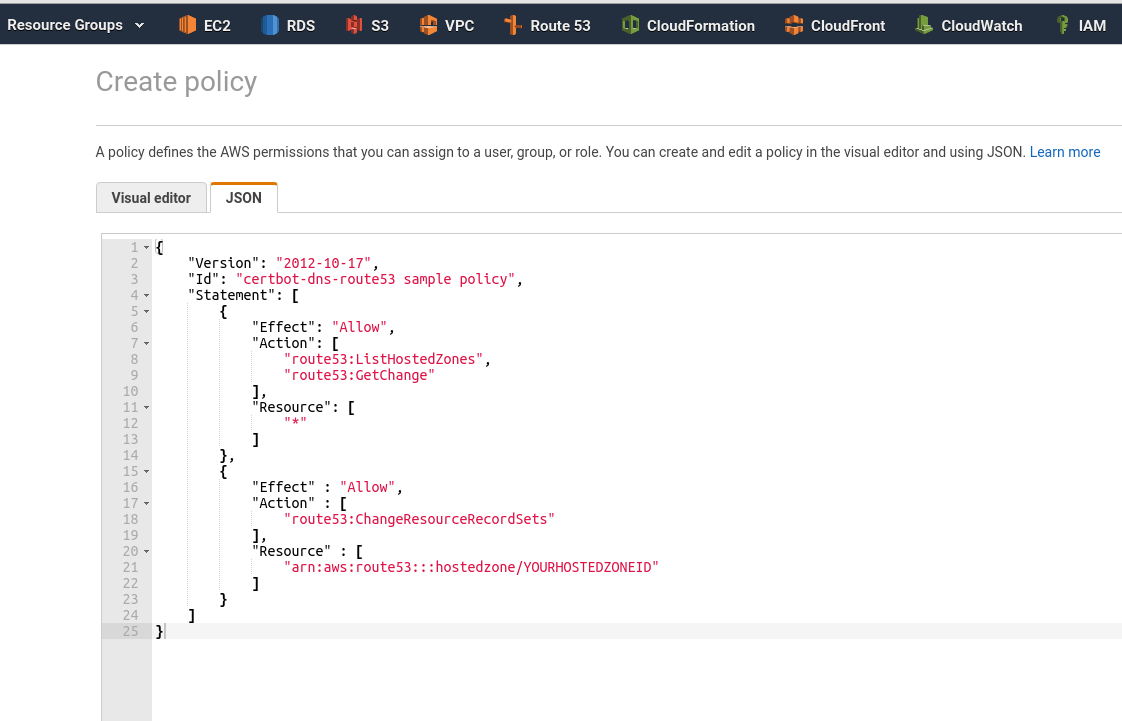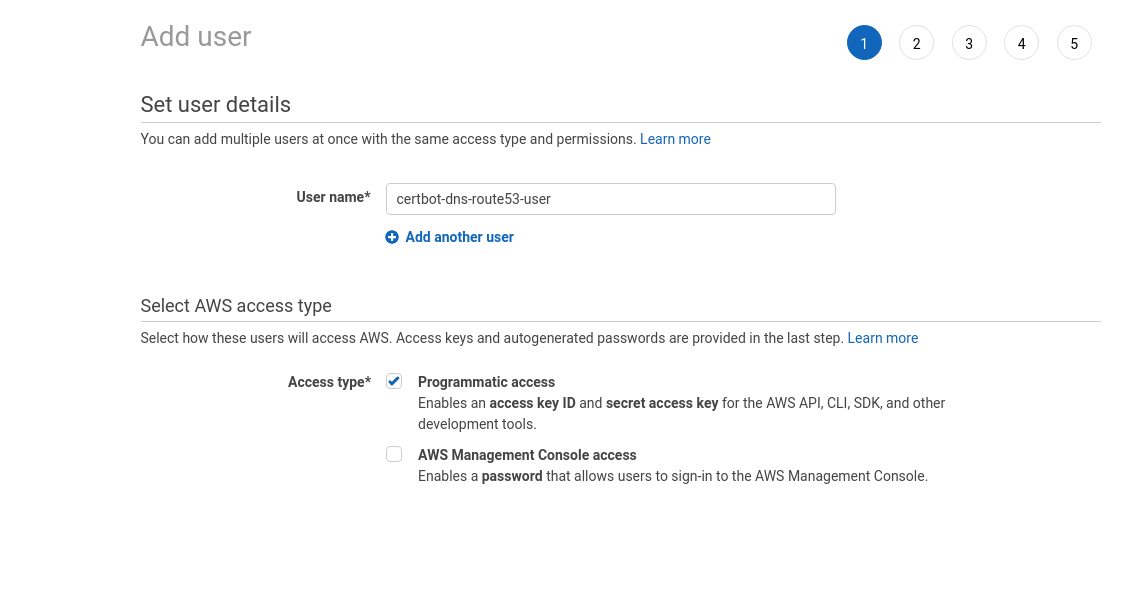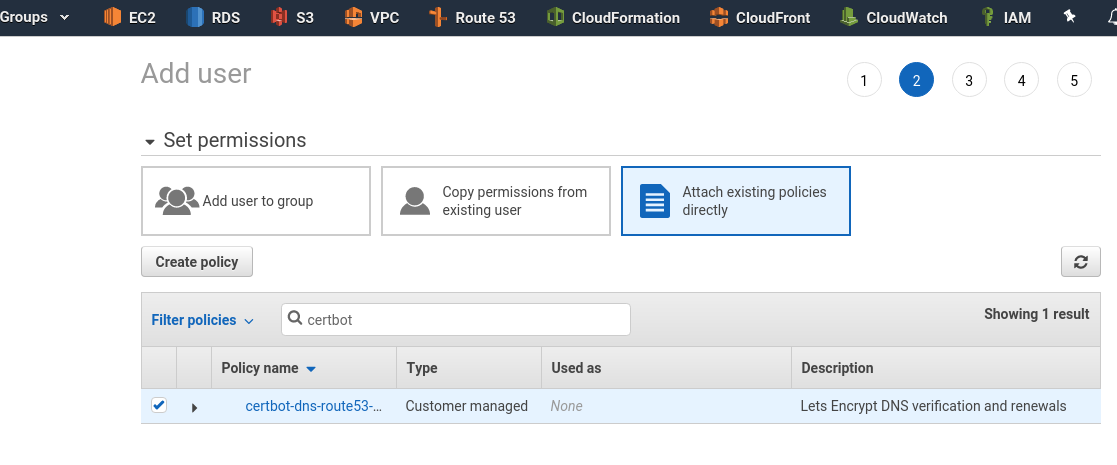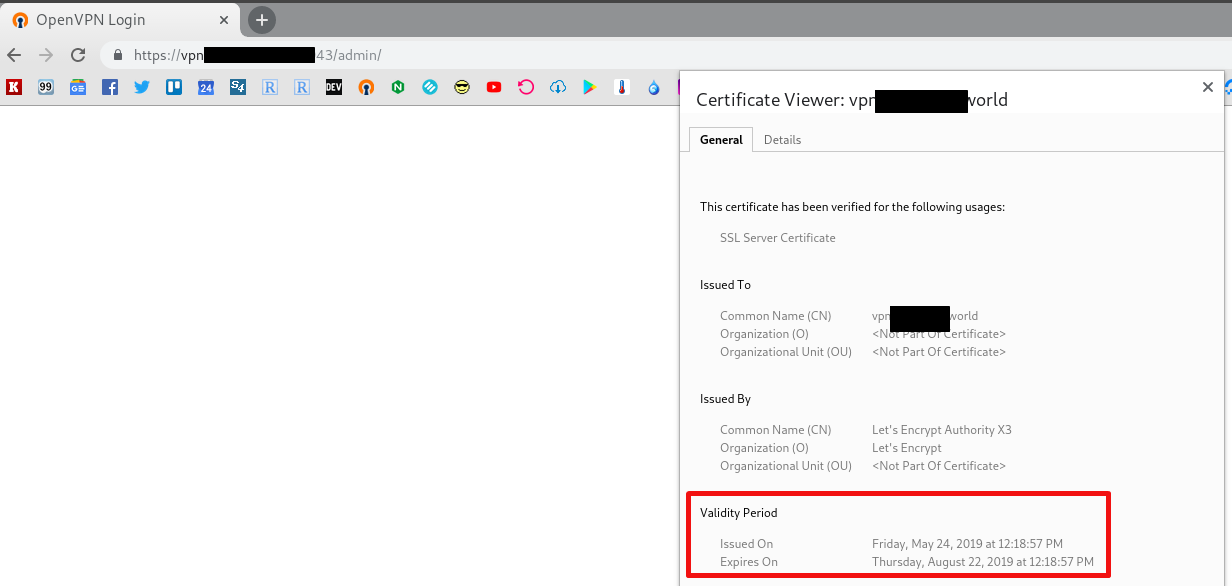 In addition to the OpenVPN: SSL and hostname configuration post about OpenVPN Access Server, set up and configuration.
In addition to the OpenVPN: SSL and hostname configuration post about OpenVPN Access Server, set up and configuration.
So, three months passed and it’s time to renew Let’s Encrypt SSL certificate (see. Prometheus: Alertmanager и blackbox-exporter — проверка срока действия SSL и нотификация в Slack, Rus).
I could use a well-know for me scheme with the webroot but OpenVPN AS accepts connections itself and there is no NGINX, and install it just for the webroot and Let’s Encrypt renewals – not too good idea.
Better let’s use DNS verification now.
Contents
AWS IAM and certbot-user
We have our domains served by AWS Route53 so use certbot-dns-route53 here.
Get your zone ID:
Create IAM-policy, in the ChangeResourceRecordSets set zone’s ID:
{
"Version": "2012-10-17",
"Id": "certbot-dns-route53 sample policy",
"Statement": [
{
"Effect": "Allow",
"Action": [
"route53:ListHostedZones",
"route53:GetChange"
],
"Resource": [
"*"
]
},
{
"Effect" : "Allow",
"Action" : [
"route53:ChangeResourceRecordSets"
],
"Resource" : [
"arn:aws:route53:::hostedzone/Z30***LB6"
]
}
]
}
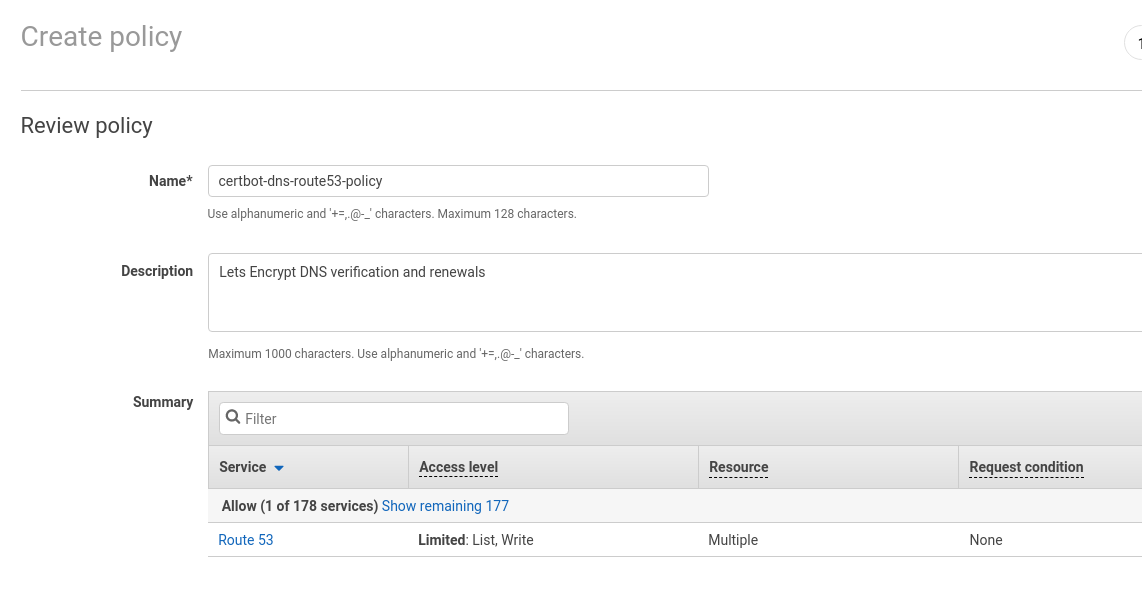 (later I thought that it could be a good idea to add zone name to the policy or user names to make them more descriptive, as zone/user has access to the only one zone here)
(later I thought that it could be a good idea to add zone name to the policy or user names to make them more descriptive, as zone/user has access to the only one zone here)
Create a new user with the Programmatic access:
In the Permissions chose Attach existing policies directly and attach policy created above:
For testing – install aws-cli:
[simterm]
root@openvpnas2:~# apt -y install awscli
[/simterm]
Under the openvpnas user configure AWS CLI default-profile:
[simterm]
openvpnas@openvpnas2:~$ aws configure AWS Access Key ID [None]: AKI***JEL AWS Secret Access Key [None]: Lry***ide Default region name [None]: Default output format [None]: json
[/simterm]
Check config:
[simterm]
root@openvpnas2:~# cat /home/openvpnas/.aws/config [default] output = json
[/simterm]
OK – profile exists and it will be used later by the certbot.
To test access – try to get zones list:
[simterm]
openvpnas@openvpnas2:~$ aws route53 list-hosted-zones --output text HOSTEDZONES 33C2D264-***-***-***-3052BEA607A9 /hostedzone/Z30***LB6 example.com. 103 ...
[/simterm]
All good here.
certbot DNS verification
Install certbot:
[simterm]
openvpnas@openvpnas2:~$ sudo apt -y install certbot
[/simterm]
And the Route53 plugin:
[simterm]
openvpnas@openvpnas2:~$ sudo apt -y install python3-certbot-dns-route53
[/simterm]
Authorize and obtain the certificate:
[simterm]
root@openvpnas2:~# certbot certonly --dns-route53 -d vpn.example.com Saving debug log to /var/log/letsencrypt/letsencrypt.log Found credentials in shared credentials file: ~/.aws/credentials Plugins selected: Authenticator dns-route53, Installer None Attempting to parse the version 0.31.0 renewal configuration file found at /etc/letsencrypt/renewal/vpn.example.com.conf with version 0.23.0 of Certbot. This might not work. Cert is due for renewal, auto-renewing... Renewing an existing certificate Performing the following challenges: dns-01 challenge for vpn.example.com Waiting 10 seconds for DNS changes to propagate Waiting for verification... Cleaning up challenges IMPORTANT NOTES: - Congratulations! Your certificate and chain have been saved at: /etc/letsencrypt/live/vpn.example.com/fullchain.pem Your key file has been saved at: /etc/letsencrypt/live/vpn.example.com/privkey.pem ...
[/simterm]
Check the zone in the Route53 – certbot must create a TXT-record here which will be used for authorization, and certbot will update it with a new value on each renewal
Check renewals config for this domain:
[simterm]
root@openvpnas2:~# cat /etc/letsencrypt/renewal/vpn.example.com.conf # renew_before_expiry = 30 days ... # Options used in the renewal process [renewalparams] authenticator = dns-route53 account = 6bc***4f6 installer = None
[/simterm]
Then will be enough just to execute certbot renew.
OpenVPN Access Server SSL update
To update SSL in the OpenVPN AS need to:
- upload the domain’s certificate:
sacli --key "cs.cert" --value_file "/etc/letsencrypt/live/vpn.example.com/cert.pem" ConfigPut - upload Let’s Encrypt’s certificate:
sacli --key "cs.ca_bundle" --value_file "/etc/letsencrypt/live/vpn.example.com/chain.pem" ConfigPut - upload our private key:
sacli --key "cs.priv_key" --value_file "/etc/letsencrypt/live/vpn.example.com/privkey.pem" ConfigPut - and restart OpenVPN server
Collect all of them in one bash-script which will be called later by cron.
Go to the OpenVPN scripts catalog:
[simterm]
root@openvpnas2:~# cd /usr/local/openvpn_as/scripts/
[/simterm]
Create a ssl_renew.sh script:
#!/usr/bin/env bash SCRIPTS="/usr/local/openvpn_as/scripts/" $SCRIPTS/sacli --key "cs.cert" --value_file "/etc/letsencrypt/live/vpn.example.com/cert.pem" ConfigPut $SCRIPTS/sacli --key "cs.ca_bundle" --value_file "/etc/letsencrypt/live/vpn.example.com/chain.pem" ConfigPut $SCRIPTS/sacli --key "cs.priv_key" --value_file "/etc/letsencrypt/live/vpn.example.com/privkey.pem" ConfigPut $SCRIPTS/sacli start
Just in case – backup exisitng keys:
[simterm]
root@openvpnas2:/usr/local/openvpn_as/scripts# cp /usr/local/openvpn_as/etc/web-ssl/server.crt /usr/local/openvpn_as/etc/web-ssl/server.crt.OLD root@openvpnas2:/usr/local/openvpn_as/scripts# cp /usr/local/openvpn_as/etc/web-ssl/server.key /usr/local/openvpn_as/etc/web-ssl/server.key.OLD
[/simterm]
Run your new script:
[simterm]
root@openvpnas2:/usr/local/openvpn_as/scripts# ./ssl_renew.sh
[True, {}]
[True, {}]
[True, {}]
RunStart warm None
{
"active_profile": "ProfileName",
"errors": {},
"service_status": {
...
"web": "restarted"
}
}
WILL_RESTART ['web', 'client']
[/simterm]
Check in a browser:
Then add a hook for certbot to run this script after renew.
Edit the /etc/letsencrypt/renewal/vpn.example.com.conf file:
... [renewalparams] authenticator = dns-route53 account = 6bc***4f6 installer = None renew_hook = /usr/local/sbin/openvpnas_renewcerts.sh
And the last thing – add a crontask with certbot renew, execute crontab -e:
0 0 * * * /usr/bin/certbot renew &> /var/log/letsencrypt/letsencrypt.log
Done.
![]()

